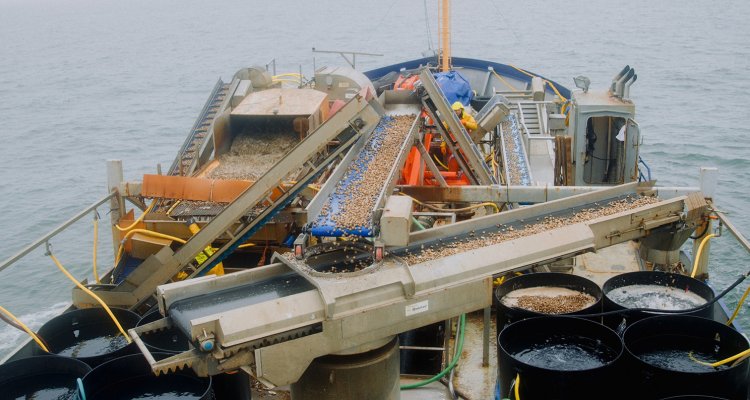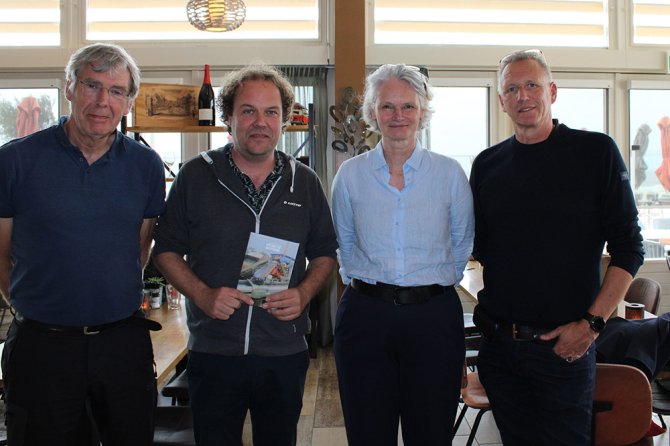
category_press_release
With good agreements, the North Sea has enough space for birds and fishermen alike
In recent years, the fishing industry has been working with scientists to investigate the sustainable catching of a North Sea shellfish. Bird conservationists also participated, working together to gain more knowledge about a sea duck that depends on shellfish as a food source. This unique collaboration now offers suggestions for 'action perspectives' to the government when looking for space for both fisheries and nature.
In the North Sea during the winter months, the cut through shell (Spisula subtruncata), also known as 'Spisula', is the main food source for the common scoter, a very timid and protected duck species. Due to various factors, the shellfish virtually disappeared from the North Sea at the beginning of this century, but recently numbers have been increasing again. This is precisely why Birdlife Netherlands is cautious about harvesting this shellfish. Limited Spisula harvesting may well be sustainable in the eyes of fishermen.
Innovative collaboration
In a five-year research project, four partners worked together, laying the foundations for shared insights that can guide the incorporation of various interests in the North Sea. In a short documentary, the four partners - the Dutch Fishermen's Association, Royal Netherlands Institute for Sea Research (NIOZ), Wageningen Marine Research and Birdlife Netherlands - give their views on the process.
Project leader Katja Philippart of NIOZ describes the innovative cooperation: "Fishermen and conservationists have very different interests at first sight. Yet in recent years the Dutch Fishermen's Union and Bird Protection Netherlands stepped over their own shadows to gather knowledge together about the triangle common scoter, Spisula fishery and rest areas."
Disturbance has more impact than thought
NIOZ and Wageningen Marine Research conducted research into the factors affecting shellfish and common scoter stocks. "Wageningen Marine Research found out that the common scoters north of the Wadden Islands are mainly affected by disturbance from ship movements," says Philippart. "And therefore not from harvesting their food source, because there is more than enough of that in the North Sea at the moment, at the current fishing effort, for the birds."
But the research shows that the common scoter is very sensitive to disturbance from all ship traffic. Philippart: "It is therefore necessary to agree on rest areas at the most suitable places where the cut through shells are located during the period when the common scoters stay in the Netherlands. Spisula fishermen can harvest shells outside these rest areas without endangering duck numbers. Only in lean Spisula years can the ducks' statutory conservation target be compromised. That is when one will have to temporarily reduce or stop shellfish harvesting." To ensure calmness in the best Spisula areas, good agreements with Spisula fishermen and especially other boating traffic are important. It is therefore also essential to know how many cut through shells are available each year.
Symposium with stakeholder organisations
The results of the project were presented to stakeholder organisations on 2 June at a symposium. In attendance was MSC (Marine Stewardship Council), which assesses and monitors the sustainability of fish consumption internationally. Christine Absil, Outreach Manager of MSC Benelux: "For MSC, sustainable harvesting is important, and this research contributes to the knowledge needed to substantiate that sustainable harvesting is possible, leaving enough food for common scoters."

Peter van Velzen, MT member Nature and Water at the Ministry of Agriculture, Nature Management and Food Quality (LNV), also attended the presentation of the action perspective. Van Velzen: "This approach provides handles for policy. Cooperation between sectors and government remains important here."
Delicacy from nearby
Many of the shellfish caught in our coastal waters end up on plates in Spain and Portugal in particular. A shift from the southern European to the Dutch market for the cut through shell would drastically reduce the number of transport kilometers. In that respect alone, a delicacy from close by is more sustainable than an alternative from far away. To make that possible, though, Dutch home cooks would like to know how to prepare Spisula. Chef Edwin Vinke of two-star restaurant De Kromme Watergang developed some recipes, included in a booklet about the project that can be picked up on the project's website.